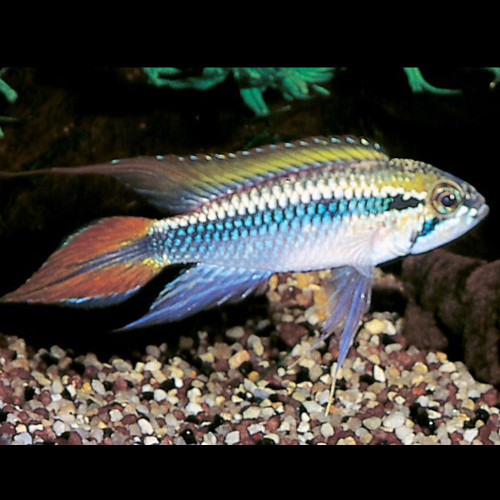SKU:
161
Our Guide To Keeping Agassiz's Double Red Dwarf Cichlid Fish
-
About Fish Species:
- Scientific name: Apistogramma agassizii
- Common name: Agassiz's Double Red Dwarf Cichlid
- Family: Cichlidae
- Origin: Amazon Basin in South America
- Adult length: 5 cm
- Lifespan: 3 to 5 years
-
Tank Setup:
- Agassiz's Double Red Dwarf Cichlids prefer a tank with plenty of hiding places and areas with dense vegetation to mimic their natural habitat. A minimum tank size of 75L is recommended for a pair of these fish.
- Provide driftwood, rocks, and caves for hiding spots, and use plants like Java Moss, Amazon Sword, and Vallisneria for cover.
-
Water Parameters:
- Agassiz's Double Red Dwarf Cichlids thrive in slightly acidic to neutral water conditions with a pH range of 6.0 to 7.5.
- Keep the water temperature between 24 to 28°C (75 to 82°F).
-
Filtration and Water Flow:
- A moderate water flow is suitable for these fish, so choose a filter that provides gentle to moderate flow.
-
Diet:
- Agassiz's Double Red Dwarf Cichlids are omnivores and will accept a variety of foods. Offer them a balanced diet consisting of high-quality flake or pellet food as a staple.
- Supplement their diet with live or frozen foods like bloodworms, brine shrimp, and daphnia to provide essential nutrients and mimic their natural diet.
-
Tank mates:
- Agassiz's Double Red Dwarf Cichlids are peaceful cichlids but can be territorial, especially during breeding. They are best kept in a species-only tank or with other small, peaceful fish species.
- Compatible tank mates include small tetras, rasboras, dwarf corydoras, and peaceful bottom-dwelling species.
-
Behavior and Compatibility:
- Agassiz's Double Red Dwarf Cichlids are territorial during breeding and may exhibit aggressive behavior towards other fish, especially intruding males.
- Provide plenty of hiding spots and visual barriers to reduce aggression, and consider keeping only one male with multiple females in the same tank.








